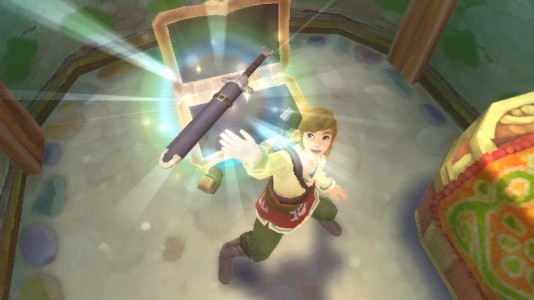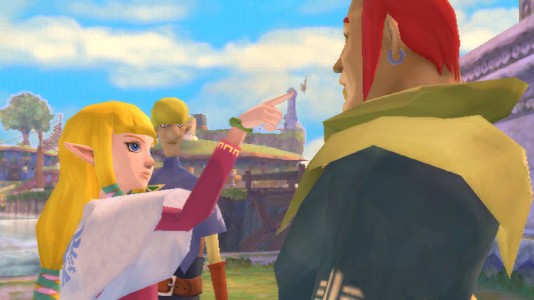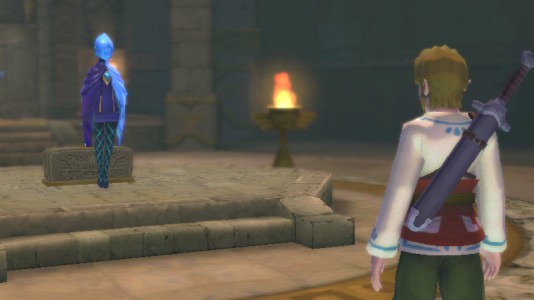Publisher: Nintendo
Developer: Nintendo
Medium: DVD
Players: 1
Online: No
ESRB Rating: E10+
The Legend of Zelda: Skyward Sword is a pretty fantastic game. That might not come as much of a surprise, as we?ve all grown used to a particular level of quality in regards to console Zelda titles, but as a long time Zelda fan that has started to grow weary of going through the motions in every game, Skyward Sword felt like a breath of fresh air.
Yes, you still play as Link, and yeah, you?ll be chasing after Zelda again. And sure, you?ve got a volcano area, and forest area, and so on. There are certain elements present in Skyward Sword that have been around in Zelda titles since the Ocarina of Time days, but as far as introducing new, quality mechanics, this is the most innovation the series has seen on home consoles since Wind Waker.
I?ll have a hard time biting my tongue in regards to specific spoilers, but trust me when I say I don?t want to ruin the experience for you. So what I will talk about is the various things you?ll be doing in the game in regards to gameplay. One of the biggest, and certainly the most important additions, is an overhauled emphasis on combat. Twilight Princess introduced the idea of waggling your Wii remote to create sword strikes, but Skyward Sword takes that concept a lot further.
When you enter into a fight with an enemy, like a Moblin style character, armored Lizardman, or even an occasional boss, you?ll still use Z targeting mechanics to lock on. A quick shake of the Wii remote will unsheathe your sword, but if you have a shield equipped you can also shake the nunchuk to pull it forward and put yourself in a defensive stance. Almost every bi-pedal enemy in the game has some type of block function, either due to armor or their own weapon. So when you go toe to toe with someone, you need to swing your Wii remote a certain way in order to hit their vulnerable area. This ends up being a little harder and more precise than you might think. And this is where the Wii Remote Plus actually starts to shine, as you can see a literal 1 to 1 movement between what you?re doing with the Wii remote and the action Link performs on screen.
Combat is certainly more difficult, but every fight you get into feels like an event. And the game does a great job of pacing out its enemy encounters so the player doesn?t get battle fatigue. You?ll come across some really base enemies like blobs and bats that can be taken down in one hit, but the other foes you encounter are actually a threat if you try to go in swinging wild.
Another important aspect of combat is blocking, or more precisely parrying attacks. If you?ve drawn your shield in combat, you can time an opponent?s strike against the shake of your nunchuk accessory, which will thrust your shield forward. A successful block will stagger an enemy and leave them open for attack, and for certain foes this will be the key to knocking them down. If you do knock an opponent to ground, you can also perform a killing strike to finish them off quickly. All in all, combat in Skyward Sword feels absolutely fantastic. It?s also remarkably precise, and you can chalk up any error to the user and not the game.
Another interesting addition to the Zelda formula is the use of upgradeable and breakable weapons. Your shield isn?t invulnerable any longer, and certain shields are actually weaker against particular enemy types. When the game begins you?ll start off with a basic wooden shield, but when you enter the volcanic region of the game it?ll be a good idea to switch over to an iron shield. Fire will literally burn your wood shield to ash, and you?ll definitely want to have a sturdy shield equipped for Skyward Sword?s dungeon areas. Each shield has a damage meter, but if you successfully parry attacks instead of just blocking you?ll not cause any damage to your shield.
As you progress through the game you?ll start to collect random items, like monster claws, horns, blobs of jelly, and other things. These items are tied into the upgrade system, which allows you to improve the shields and other items you carry. A large variety of Link?s typical inventory is upgradeable, and some of the items needed to do these upgrades can be quite rare. Another big aspect to the game is bug collecting, and similar to Animal Crossing, the game will keep track of all your finds and craftable materials via an in-game album. The only annoying aspect of this is that every time you end a game and go back in, the game will go through a small text description as you pick items up, even if you?ve encountered them before.
Skyward Sword also has a series of side quests mostly related to townsfolk Link encounters. Generally these involve finding a lost loved one or item, and completing tasks are always optional but generally give out decent items. Finishing these tasks also tie into a much larger side quest that I have yet to actually finish. This also leads me to mention that this is a pretty long Zelda adventure, especially if you plan to finish it 100 percent. For the review I had to stick to the critical path to get this up prior to the launch of the game, but I still have a fair number of things to finish. Even then, I?m well over the 30 hour mark.
Besides the heavy emphasis on combat, everything else works really well control-wise. There are some changes to the way familiar items work, like bombs that can now be rolled as well as tossed. There are also a number of new dungeon items that you?ll find throughout, along with some notable items that are completely missing. I?m alright with that though, as the new introductions all tend to be pretty useful, both inside and outside of the dungeons.
The overworld structure is also a little different, and I?d be lying if I said the flying from island to island didn?t remind me a bit of traveling across the ocean in Wind Waker. There are a lot of little optional places to check out, and there?s a whole series of hidden chests to uncover scattered across the top world of the game. These contain your usual Zelda items like heart containers, but are certainly worth seeking out.
Also worth mentioning is that the visual style of the game is pretty great. I?ve been digging it since the onslaught of trailers we?ve seen in the past few months, but it?s been nice to see it all come together. Its right up there with the cel-shaded look of Wind Waker for me, and it?s certainly more appealing than I found Twilight Princess to be. The Wii is starting to show its age, but the style used here does a pretty job of masking the technical limitations of the hardware in the same way the Mario Galaxy games tend to do. Likewise, the soundtrack is fantastic. I really love the main theme of Skyward Sword, but there are a lot of great dungeon tracks as well. There are certainly a number of themes that?ll make their way into the top tier lists of Zelda music for a lot of fans.
So yeah, you should buy Skyward Sword. There?s a good chance you were going to anyways, but if you had any doubts coming out of Twilight Princess or the even the DS titles, you can put them to rest. This is a fantastic entry into the pantheon of Zelda titles, and a pretty great swan song for the Wii.




